Bringing a new life into the world is a transformative experience, but it also comes with significant emotional and physical changes. For some new mothers, these changes may lead to postpartum depression (PPD), a serious condition that affects mental health and well-being. Understanding the signs, symptoms, and available treatment options is crucial for both new parents and their support systems.
What is Postpartum Depression?
Postpartum depression is a mood disorder that can affect individuals after childbirth. It is more intense and longer-lasting than the “baby blues,” which are common feelings of sadness and anxiety that typically resolve within two weeks after delivery. According to the National Institute of Mental Health (NIMH), PPD can interfere with a mother’s ability to care for herself and her baby, making early intervention essential.
Signs and Symptoms
PPD symptoms can vary in severity but commonly include:
- Persistent sadness, hopelessness, or feelings of emptiness
- Loss of interest or pleasure in activities once enjoyed
- Severe fatigue or lack of energy
- Changes in appetite and sleep patterns
- Difficulty bonding with the baby
- Intense irritability or mood swings
- Feelings of worthlessness, guilt, or excessive worry
- Thoughts of harming oneself or the baby (in severe cases)
If symptoms persist for more than two weeks or significantly impact daily functioning, professional help should be sought immediately.
Causes and Risk Factors
While the exact cause of PPD is unknown, several factors can contribute to its development, including:
- Hormonal Changes: The rapid decline in estrogen and progesterone levels after childbirth can affect mood regulation.
- History of Depression or Anxiety: Individuals with a personal or family history of depression are at higher risk.
- Sleep Deprivation: The demands of caring for a newborn can lead to chronic sleep disruption, exacerbating emotional distress.
- Lack of Support: Social isolation or lack of emotional and practical support from family and friends can increase vulnerability.
- Complicated Pregnancy or Birth: Traumatic delivery experiences or medical complications can contribute to PPD.
Treatment Options
PPD is treatable, and various interventions can help new mothers recover. Some of the most effective treatment options include:
1. Therapy
- Cognitive Behavioral Therapy (CBT): Helps individuals identify and change negative thought patterns.
- Support Groups: Connecting with others who have similar experiences can reduce feelings of isolation.
2. Medication
For some individuals, medication can be an effective part of treatment. There are safe options available for postpartum individuals, including those who are breastfeeding. A healthcare provider can help determine the best approach based on individual needs and circumstances.
3. Lifestyle Adjustments
- Regular Exercise: Physical activity has been shown to improve mood and reduce symptoms of depression.
- Adequate Nutrition: A balanced diet can support overall well-being.
- Prioritizing Sleep: Seeking help from a partner, family, or friends to get rest is crucial.
4. Seeking Support
Open communication with partners, family, and healthcare professionals can make a significant difference in recovery. Encouraging new mothers to seek help and reducing the stigma surrounding postpartum mental health is vital.
How Birch Grove Mental Health Can Help
At Birch Grove Mental Health, we understand the challenges of postpartum depression and are here to support you. Our team of skilled professionals utilizes evidence-based therapies to help individuals navigate this difficult period. If you or a loved one is struggling with PPD, we are here to provide compassionate care and effective treatment options.
Final Thoughts
Postpartum depression is a serious but treatable condition. Awareness, early intervention, and access to professional support can help individuals navigate this challenging period and regain their well-being. If you or someone you know is struggling with PPD, don’t hesitate to seek help from a qualified healthcare provider at Birch Grove Mental Health.
Sources:
- Harvard Medical School: https://www.health.harvard.edu
- National Institute of Mental Health (NIMH): https://www.nimh.nih.gov

